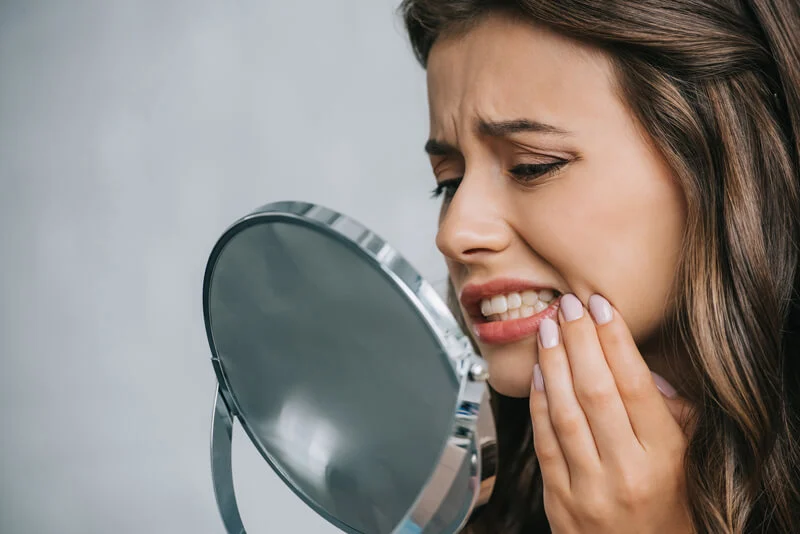Silverado Ranch: 702 586 7800
Medical District: 702 870 3818
Safe, gentle wisdom teeth removal at Dee for Dentist with advanced imaging and sedation options. Prevent problems, comfortable experience. No insurance? No problem! We offer 0% APR financing and in-house membership plans.

Many people lack enough space needed to keep their complete set of teeth. Partially erupted wisdom teeth often cause teeth crowding or other misalignments, requiring professional wisdom teeth removal Las Vegas residents can trust. Not everyone will keep their wisdom for life—in fact, only 15% of people retain these adult teeth permanently. If you’re experiencing pain in the back of your mouth or notice swelling near your molars, it may be time to consult a qualified oral surgeon at our dental office.
At Dee for Dentist, we understand that many patients experience dental anxiety when facing wisdom tooth extraction ranges from simple to complex procedures. Our compassionate team offers comprehensive sedation options to ensure your comfort throughout the entire process. Whether you need same day tooth extractions or prefer to schedule your wisdom tooth appointment in advance, we’re here to provide exceptional care at our two convenient Las Vegas locations.
These have their nickname from erupting later on in life, often in late teens or early twenties. Since they come in so late, they’re called wisdom teeth because wisdom is said to come with age. However, incoming wisdom teeth can create significant challenges when there isn’t enough space in your jaw to accommodate them properly.
Partially erupted wisdom teeth present unique challenges that require attention from an experienced oral surgeon. When these teeth only break through the gum line partially, they create pockets where bacteria can accumulate, leading to infection and decay. The lack of roof means these teeth cannot function properly for chewing, making them essentially useless while still causing potential harm to neighboring teeth.

Expert implant consultation at no cost. Discover your options for permanent tooth replacement solutions.

The main issue with wisdom teeth is if they come and there is not enough room for them. Our oral surgeon team evaluates each case individually to determine the best course of action. This often leads to other issues requiring prompt attention:
Tooth decay affecting wisdom teeth or nearby teeth
Persistent pain in teeth, gums, or jawbone
Damage to adult teeth already properly positioned
Misalignment affecting your bite
Cyst formation around impacted teeth
Severe infection of gum disease requiring immediate care
Bone loss in the jaw area
Understanding these warning signs helps patients avoid more costly dental procedures down the line. Early intervention can prevent complications and reduce the need for emergency dental care later.
While each individual treatment is always different, all cases use anesthetic to control pain and provide a more comfortable experience. Our office specializes in IV sedation and local injectable anesthesia to ensure you remain comfortable throughout the procedure. For patients with dental anxiety, we offer various sedation options tailored to your comfort level and the complexity of your extraction.
Your oral surgeon will create a personalized treatment plan based on your specific needs. The procedure typically involves making a small incision in the gum tissue to access the tooth, removing any bone blocking access, and carefully extracting the tooth. For partially erupted wisdom teeth, the process may require sectioning the tooth into smaller pieces to painlessly remove it with minimal trauma to surrounding tissues.

Dedicated professionals committed to your smile.

Lead Dentist
Graduating from UNLV School of Dental Medicine, Dr. Dee Dee brings advanced technology and a gentle touch to every treatment.

General Dentist
First graduate of UNR/UNLV's accelerated program, Dr. Montero combines expertise with a warm, caring approach.

Cosmetic Specialist
With a passion for fitness and health, Dr. Ana ensures your dental visits are as enjoyable as they are effective.
Recovery can last a considerable time and may prompt a lifestyle change, even if it’s only temporary. The healing process varies for each patient, but following detailed post op instructions is crucial for optimal recovery. Our team provides comprehensive post op instructions to guide you through each stage of healing.
For the best, quickest, and most pain-free recovery, we suggest:
Stop smoking immediately to prevent dry socket
Avoid alcoholic beverages during the healing period
Exclusively consume softer foods for at least 24 hours
Stay hydrated with plenty of water
Avoid brushing your teeth and rinsing your mouth for the first day
Skip physical activity, even minor exercise
Apply ice packs to reduce swelling
Take prescribed pain medication as directed
Your oral surgeon will prescribe appropriate pain medication to manage discomfort during the initial healing process. Most patients find that over-the-counter pain relievers are sufficient after the first few days.

If you need convincing to remove wisdom teeth, we can make the decision process more straightforward. Professional extraction by a skilled oral surgeon provides numerous benefits:
Working with an experienced facial surgery specialist ensures precise technique and minimal complications. Our team’s expertise in facial surgery procedures means we understand the delicate anatomy involved and can perform extractions with exceptional care. This expertise particularly matters for complex cases involving partially erupted teeth or those near important nerves.
The benefits extend beyond immediate relief:
Protection of neighboring teeth from damage to enamel or roots
Prevention of future infections and severe infection complications
Improved oral hygiene access to back areas
Alleviation of chronic pain and discomfort
Prevention of costly dental procedures in the future
Reduced risk of bone loss in the jaw
Clearer speaking and easier chewing
Elimination of bad breath caused by trapped food particles
Wisdom tooth removal in Las Vegas ranges from $200–$1,100 per tooth based on how impacted the tooth is. Simple extractions for fully emerged teeth cost less, while surgical removal of impacted teeth requires more complex procedures and higher fees. The typical cost range for full-mouth wisdom tooth removal with IV sedation or general anesthesia is $1,000–$3,000.
Multiple payment options to fit your budget – because everyone deserves a healthy smile
We partner with leading healthcare financing companies to make your dental care affordable with low monthly payments.
No insurance? No problem! Our Plan for Health membership is an affordable alternative to traditional insurance.
We work with Delta Dental, MetLife, and many other major insurance providers. Our team will help verify your benefits and maximize your coverage. We'll handle the paperwork so you can focus on your health.
Don't see your insurance listed? Call us – we likely accept it!
Call About Coverage: (702) 586-7800Choose the location nearest you for exceptional dental care
Everything you need to know about Invisalign
Wisdom teeth should be removed when they cause pain, crowding, infection, damage to other teeth, or when there isn’t enough room in your mouth for them to emerge properly. Most people have their wisdom teeth removed between ages 17-25 when the roots are not fully developed.
The procedure typically takes 45 minutes to an hour, depending on the complexity of the extraction. Simple extractions may take 20-30 minutes, while more complex surgical extractions can take up to an hour or more.
Recovery typically takes 3-4 days for initial healing, with complete healing taking 1-2 weeks. You may experience swelling, mild discomfort, and bleeding for the first few days. Following post-operative instructions is crucial for proper healing.
The procedure itself is not painful as you’ll receive local anesthesia or sedation. Post-operative discomfort is normal and manageable with prescribed pain medication and proper care. Most patients report minimal pain when following recovery instructions.